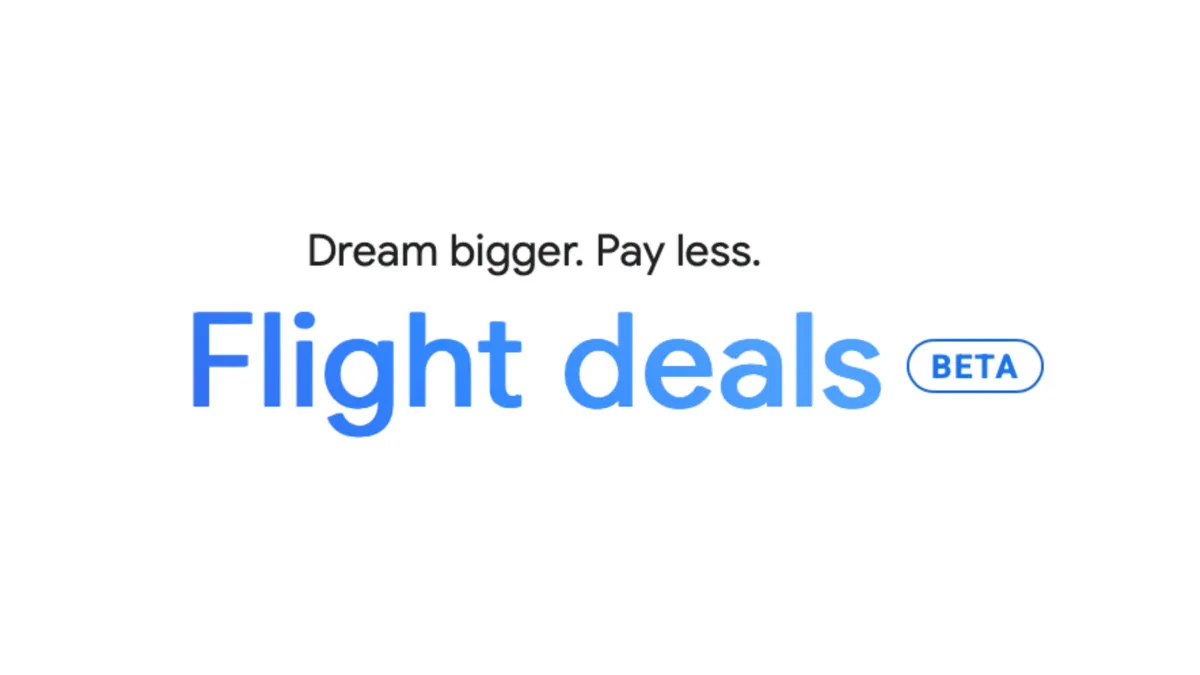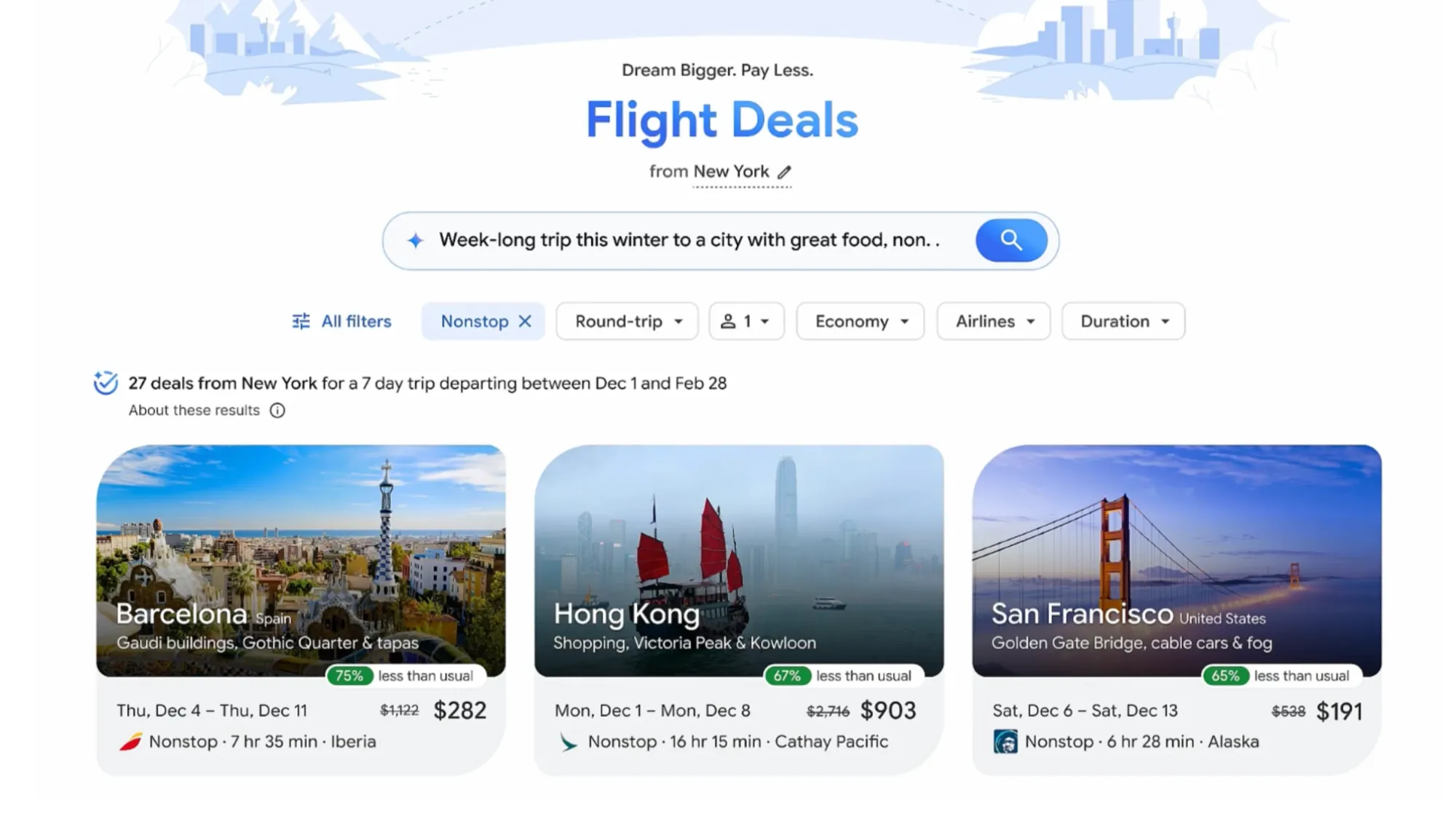
Google introduced Flight Deals, an artificial intelligence-powered search tool within Google Flights, on August 14, 2025. According to Google's announcement, the experimental beta feature launched simultaneously across the United States, Canada, and India for signed-in users in English.
Flight Deals represents a significant departure from traditional flight search methodologies. Instead of requiring users to specify exact destinations and dates, the system interprets natural language queries such as "week-long trip this winter to a city with great food, nonstop only" or "10 day ski trip to a world-class resort with fresh powder." According to Jade Kessler, Product Manager for Google Flights, the tool targets "flexible travelers whose number one goal is saving money on their next trip."
Subscribe the PPC Land newsletter ✉️ for similar stories like this one. Receive the news every day in your inbox. Free of ads. 10 USD per year.
The system employs Google's advanced artificial intelligence to bridge the gap between travel ideas and specific flight data. According to the help documentation, the technology "understands travel intent and interprets natural language" while identifying "potential destinations and dates that fit your criteria." When users request a "beach escape," the system suggests flights to popular coastal destinations without requiring individual research of specific locations.
Google sources its flight inventory from more than 300 partners to generate search results. The company emphasizes that flight prices change frequently, making deals subject to availability with potential price variations at booking time. The platform defines a flight as a "deal" when its price registers significantly lower than typical pricing for similar trips.
The pricing analysis incorporates sophisticated algorithms examining median values of the cheapest prices found for specific routes over the past 12 months. Factors including time of year, trip length, and cabin class influence these calculations. According to the documentation, user-set filters for stops or carriers also affect price determinations.
Two distinct deal categories appear in search results. Savings Deals receive highlighting with a "% less than usual" badge when flight prices register at least 20% lower than typical pricing, displaying the standard price with strikethrough formatting. Cheap Flights showcase the lowest available fares to popular destinations matching search criteria, though these may not represent percentage savings compared to typical pricing and lack special badges.
Results ranking prioritizes savings percentage, with the highest percentage savings appearing first. When multiple deals share identical savings percentages, the system displays lower absolute prices first. Results without savings badges rank by lowest price. According to Google, this approach helps users identify the best value options while acknowledging that frequent price changes may affect final rankings and availability.

The tool incorporates geographical and temporal intelligence. According to the help center documentation, users accessing Flight Deals without specific searches receive "a variety of deals from your location to popular destinations for week-long trips in the next 6 months." The system determines popular destinations through artificial intelligence analysis of historically popular destinations matching user searches.
Current limitations reflect the experimental nature of the platform. Unsupported searches include multi-city trips such as London to Paris followed by Paris to Rome, trips with multiple departure cities, travel dates very far in the future, specific passenger types or groups larger than four people, and specific layover requests. Google indicates these capabilities may expand over time.
The marketing implications for the travel industry extend beyond consumer convenience. Traditional travel advertising strategies face disruption as AI-powered features change how travelers discover and evaluate flight options. Google's integration of artificial intelligence across its advertising platforms demonstrates broader shifts in digital marketing approaches, particularly as AI features increasingly retain users within Google's ecosystem rather than directing them to external travel websites.
The timing aligns with Google's broader artificial intelligence strategy. Recent developments include the expansion of AI Mode to UK users and AI Overviews driving 10% additional search queries globally. These initiatives collectively represent Google's commitment to transforming search experiences through artificial intelligence while maintaining advertiser value propositions.
Flight Deals accessibility occurs through direct navigation to the dedicated Flight Deals page or via the top-left menu on Google Flights. The no opt-in requirement simplifies adoption for existing Google Flights users. Google positions the tool as complementary to traditional Google Flights functionality, which continues receiving feature enhancements including a new option to exclude basic economy fares for United States and Canada trips.
The beta designation acknowledges ongoing development as Google gathers user feedback. According to Kessler, the company aims to "explore how AI can improve travel planning" while maintaining the original Google Flights experience. Feedback collection occurs through a dedicated button in the bottom right corner of the page.
User experience design emphasizes simplicity over complexity. Rather than overwhelming travelers with extensive filtering options, Flight Deals focuses on understanding travel intentions through conversational input. This approach contrasts with traditional booking platforms that require users to navigate multiple dropdown menus and selection criteria before receiving results.
The artificial intelligence implementation demonstrates Google's broader strategy of applying machine learning to practical consumer applications. Similar to how Google Ads Editor 2.10 introduced AI-powered tools for advertising professionals, Flight Deals brings artificial intelligence capabilities to travel planning while maintaining user control over final purchasing decisions.
Industry observers note the potential impact on traditional travel agencies and booking platforms. By reducing friction in the initial search and discovery phase, Flight Deals may capture user attention earlier in the travel planning process. However, the tool maintains connections to existing booking systems rather than creating a closed ecosystem, preserving partnerships with airline and travel industry stakeholders.
The global rollout strategy reflects Google's measured approach to launching experimental features. Starting with English-language markets in three countries allows for controlled feedback collection while testing technical infrastructure under real-world conditions. The geographic limitation to signed-in users provides additional data collection opportunities while managing system load during initial deployment phases.
Competition in AI-powered travel search continues intensifying as various platforms integrate artificial intelligence capabilities. Flight Deals positions Google to compete with emerging AI travel assistants while leveraging its existing relationships with airlines and travel industry partners. The integration within Google Flights rather than as a standalone application maintains consistency with user expectations while expanding functionality.
Privacy considerations remain consistent with existing Google Flights policies, according to the company documentation. The artificial intelligence processing occurs within Google's existing infrastructure without requiring additional data sharing agreements or permissions beyond standard Google Search terms. This approach simplifies adoption while maintaining user privacy protections.
The feedback mechanism built into Flight Deals suggests Google's commitment to iterative improvement based on real user experiences. The experimental classification allows for rapid adjustments and feature additions based on usage patterns and user suggestions. This development approach mirrors Google's strategy with other AI-powered features across its product portfolio.
Subscribe the PPC Land newsletter ✉️ for similar stories like this one. Receive the news every day in your inbox. Free of ads. 10 USD per year.
Timeline
- August 14, 2025: Google announces Flight Deals launch in beta for US, Canada, and India
- July 2025: Google introduces AI Mode to UK users, expanding conversational search capabilities
- July 23, 2025: Google reports AI Overviews driving 10% additional search queries globally
- July 8, 2025: Google Ads Editor 2.10 launches with AI features for advertising professionals
- May 2024: Google begins widespread AI Overviews rollout to US users
- October 2024: Google expands Travel Feeds in Search Ads for hotel advertisers globally
Subscribe the PPC Land newsletter ✉️ for similar stories like this one. Receive the news every day in your inbox. Free of ads. 10 USD per year.
PPC Land explains
Artificial Intelligence: The core technology powering Flight Deals represents Google's advanced machine learning capabilities that interpret natural language queries and match them with relevant flight data. This AI system bridges the gap between conversational travel requests and structured search parameters, allowing users to describe trips in their own words rather than selecting specific destinations and dates from dropdown menus.
Google Flights: The established flight search platform serves as the foundation for Flight Deals integration, maintaining its existing functionality while adding AI-powered features. Google Flights already processes inventory from more than 300 airline partners and provides price tracking, fare comparison, and booking facilitation services that Flight Deals leverages for its enhanced search capabilities.
Natural Language: The system's ability to process conversational queries distinguishes Flight Deals from traditional search interfaces that require structured input. Users can request "romantic weekend getaways" or "see the cherry blossoms in Japan" instead of specifying exact destinations, dates, and passenger counts through multiple form fields.
Beta Feature: The experimental classification allows Google to gather user feedback and refine functionality before full deployment. Beta status provides flexibility for rapid iteration and feature adjustments based on real-world usage patterns, while managing user expectations about potential limitations and ongoing development.
Travel Intent: Google's AI analyzes the underlying purpose and preferences expressed in user queries to identify suitable destinations and travel options. This capability transforms vague travel ideas into specific flight recommendations by understanding context clues about preferred activities, destinations types, and travel styles.
Savings Deals: Flights qualifying for this designation must cost at least 20% less than typical pricing for similar routes, receiving special highlighting with percentage savings badges. The system calculates typical prices using median values of the cheapest fares found over the past 12 months, considering factors like seasonality, trip duration, and cabin class.
Flight Search: The traditional process of finding flights typically requires users to specify exact departure and arrival airports, specific travel dates, and passenger details before receiving results. Flight Deals transforms this rigid structure into a more intuitive experience that begins with travel aspirations rather than predetermined logistics.
Price Analysis: Google's algorithm examines historical pricing data across 12-month periods to establish baseline costs for specific routes and travel patterns. This analysis incorporates variables including time of year, trip length, cabin class preferences, and user-specified filters for stops or airline carriers to determine when current prices represent genuine deals.
User Experience: The simplified interface prioritizes ease of use over comprehensive filtering options, reflecting Google's strategy of reducing friction in travel planning. Rather than overwhelming users with extensive configuration choices, Flight Deals focuses on understanding travel intentions through conversational input and presenting relevant options with clear value propositions.
Search Results: The ranking system prioritizes deals by percentage savings first, followed by absolute price when savings percentages match. Results include both Savings Deals with special badges and Cheap Flights without percentage discounts but representing lowest available fares, providing users with multiple value options while maintaining transparency about pricing advantages.
Subscribe the PPC Land newsletter ✉️ for similar stories like this one. Receive the news every day in your inbox. Free of ads. 10 USD per year.
Summary
Who: Google launched the feature targeting flexible travelers prioritizing cost savings, developed by Product Manager Jade Kessler and the Google Flights team.
What: Flight Deals is an experimental AI-powered search tool within Google Flights that interprets natural language travel queries and identifies cost-effective flight options from over 300 airline partners.
When: The feature launched on August 14, 2025, in beta form with rollout occurring over the following week.
Where: Initial availability covers the United States, Canada, and India for signed-in users searching in English, accessible through Google Flights' dedicated Flight Deals page.
Why: Google developed Flight Deals to simplify travel planning for budget-conscious travelers while advancing AI integration across its search products and maintaining competitive positioning in the travel technology market.

